In this excerpt of an interview late last week with WRAL-TV anchor David Crabtree, NC Governor Pat McCrory, when asked about Medicaid, said that expansion would now have to wait at least three years for health reforms to take place in the state. McCrory also highlighted an Oval Office meeting he and several other Governors had with President Obama where he said that his irreconcilable differences with the President in that meeting precluded consideration of expansion.
https://vimeo.com/144151703
McCrory’s stance was quite a change from the beginning of this year just after that meeting with the President when McCrory was much more positive about the possibility of presenting a “North Carolina” plan to move forward with using the federal Medicaid funding for expansion. A typical headline:
North Carolina’s Governor wasn’t asked to explain his change of heart although the politics of what most political observers expect will be a very closely fought gubernatorial election next year may have played a part. However, as we have seen time and again when looking at the politics around Medicaid, this debate is very state specific and nonpartisan – it is taking place almost entirely among Republicans and the outcome changes based on shifting state political, fiscal and policy perceptions.
Illustrating this, conservative governors and even gubernatorial candidates can be found over the last couple of weeks taking precisely the opposite position of North Carolina’s chief executive during an election. The most prominent example is in Louisiana’s hard-fought race for Governor where every candidate regardless of party affiliation has stated they are interested in exploring Medicaid expansion. This includes the two candidates in the runoff election now scheduled for November 21, Republican David Vitter and Democrat John Bel Edwards. The difference with the situation in North Carolina is likely prompted in Louisiana by the state’s dire fiscal condition, the high unpopularity of current Governor and vocal expansion opponent Bobby Jindal, and a significant institutional support for using the federal Medicaid dollars.

Another state in the South with surprising movement on this issue from a conservative chief executive is Alabama. There Governor Robert Bentley has been in the news lately for making some – admittedly very cautious – moves towards discussion of a Medicaid plan for his state. Political pressures are few on Bentley and so the discussion seems an honest effort back towards consideration of health policy with Bentley reportedly meeting repeatedly with HHS Secretary Burwell on Medicaid waivers.
But the South isn’t the only place seeing consideration by conservative governors of Medicaid expansion issues despite the coming election year. In South Dakota, Governor Dennis Daugaard has started serious discussions about crafting a Medicaid plan for his state. There health policy considerations and a potential change by the federal government in how health services are paid for Medicaid-eligible Native Americans and Alaska Natives have pushed the discussion into high gear.
 This proposed payment change by the federal government is a huge and overlooked potential game-changer for some states in the Medicaid expansion debate. Basically, the federal government is proposing to pick up 100% of the cost of providing health care for Medicaid-eligible patients of the Indian Health Service even though in a modern health system many of those services, while overseen by IHS doctors and facilities, may be provided by other specialists not housed within IHS.
This proposed payment change by the federal government is a huge and overlooked potential game-changer for some states in the Medicaid expansion debate. Basically, the federal government is proposing to pick up 100% of the cost of providing health care for Medicaid-eligible patients of the Indian Health Service even though in a modern health system many of those services, while overseen by IHS doctors and facilities, may be provided by other specialists not housed within IHS.
However, as with any policy where politics plays such a huge role, the picture isn’t so simple for all governors. In a come-from-behind upset win yesterday, Kentucky’s Matt Bevin – who had pledged to roll back the state’s Medicaid expansion (he since tried to soften that position saying last night he would like to modify the existing expansion with a 1115 waiver) – won the gubernatorial race in a convincing fashion.
And Utah’s conservative Governor Gary Herbert still remains committed to moving forward a Utah-crafted plan for extending health coverage using Medicaid funding despite another recent defeat of a Medicaid expansion plan from Utah legislators:
Finally, a Governor bucking the trend on Medicaid along with North Carolina’s McCrory is Kansas Governor Sam Brownback. Brownback’s communications director called a policy of expanding Medicaid in the state “morally reprehensible.” This resulted in editorials in Kansas like this one:
Add this to the fact that Governor Brownback currently has an approval rating of 18 percent (President Obama has 28 percent approval in Kansas), perhaps North Carolina’s Governor may want to rethink his change of heart.
Across the country we know that many conservative states continue to resist moving on plans to expand Medicaid. However, the position seems to becoming less and less a litmus test of opposition to all things federal and more one driven by state politics and the policy environment. Given this, it would be a mistake to conclude that the deep red interactive map showing high numbers of uninsured in states that haven’t yet expanded Medicaid so ably put together last week by the New York Times’ Quoctrung Bui and Margot Sanger-Katz will remain static for long.









